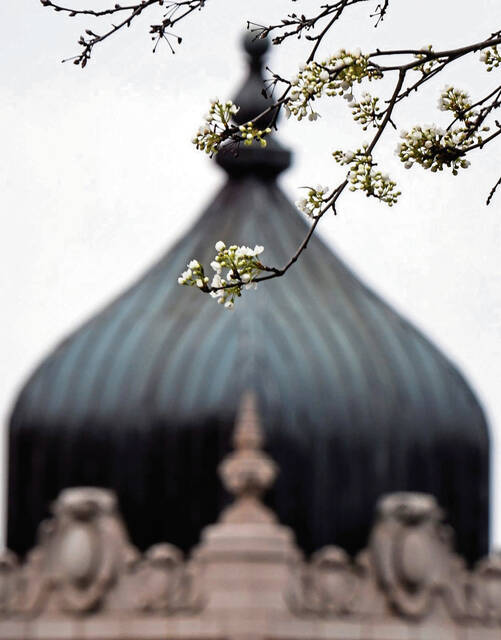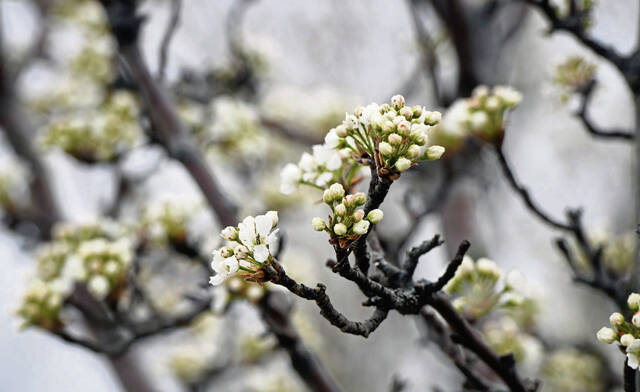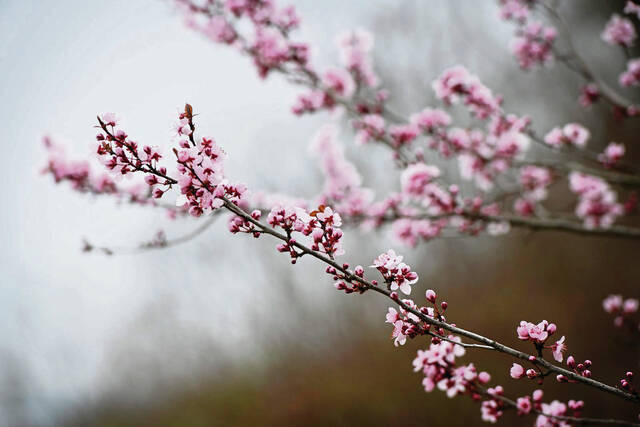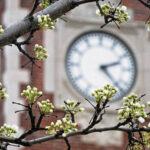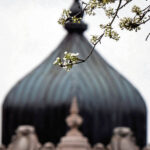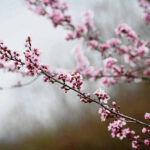When Dr. Bob Gorby of Westmoreland Allergy and Asthma Associates in Greensburg notices the tree in his home’s backyard starting to bud, he knows it’s tree pollen season.
“It’s early this year a little bit,” he said. “Tree pollen can come out as early as late February, but it’s very seldom that that happens. This year it seemed to do that.”
Dr. Kumar Patel of Advanced Allergy and Asthma in Tarentum said he has also seen a “burst” of patients calling his practice to complain of an increase in allergy symptoms.
“It’s a little earlier than expected, but this is about right,” he said. “This is about when the weather changes come up and you start seeing the pollen.”
Gorby and Patel are among many area doctors who’ve noticed the spring allergy season has appeared a little before schedule. They both credit a mild winter as a main cause of allergy sufferers’ distress.
According to the National Weather Service Pittsburgh, this winter has been the warmest on record for the region since the station moved to the airport in Moon in 1952.
Meteorologist Jared Rackley said this March is on track to be the second warmest March in 70 years.
“This winter was so light, and you didn’t get as much cold as you would have expected,” Patel said. “When the temperature changes to warmer weather, as soon as you get that, now you get the pollination occurring.”
And according to allergist Dr. Russell Traister of AHN’s West Penn Hospital, the worst of spring allergy season may be yet to come.
“The tree pollen counts just started to come up last week,” he said. “We’re definitely not at the peak yet, but with the tree pollen starting to poke out, people are definitely starting to have their allergy symptoms come up.
“I think Punxsutawney Phil was definitely right with the early spring,” Traister said. “I think everything is popping up a little bit early.”
Seasonal shift
The increasing overlap between the seasons could be exacerbating symptoms, said Dr. Thomas Mertz, allergist at Allergy and Asthma Associates of Pittsburgh in Harmar.
The wintertime and year-round indoor allergens of dust, pet dander and mold are still present, and outdoor tree pollen is beginning to ramp up at the same time, he said. Later in the spring, the time between tree pollen season and the summer grass pollen season have also begun to blur.
“There’s been overlap with allergens. The growing seasons are extended, and they come earlier and go later,” he said. “Not only are you having one thing at a time, you’re having multiple things at a time.”
Dr. Hey Chong, division director of pediatric allergy and immunology at UPMC Children’s Hospital of Pittsburgh, described it another way: Allergy seasons have been getting longer. She had patients calling in at the end of February to report allergy symptoms.
“I came to Pittsburgh from Boston in 2011, and we used to give handouts for patients that said the tree pollen season starts mid-March,” she said. “Now, we don’t use (the handouts) because we have patients that have allergy symptoms that start in February.”
Mertz said he has seen more patients complain of mold allergy symptoms this winter because of the lack of a deep freeze to tamp it down.
“What I usually heard this winter was, ‘gosh, I am really suffering, is it the pollen yet?’” he said. “The main thing they are probably exposed to is the mold. While it’s great that I didn’t have to shovel any snow and it was kind of warmer, anytime you have that, because we have so much rainfall and moisture, the mold definitely sticks around.”
Pollution and poor air quality also can exacerbate seasonal allergy symptoms, he explained. Diesel exhaust particles tend to stick together with pollen, he said, and when someone inhales both at the same time, it has a “synergistic effect,” increasing the irritation.
Fluctuating warm and cold weather, like the region has experienced over the past few weeks, isn’t usually enough to fully dissipate allergens, Chong said. Humidity or dryness and the presence of asthma and other respiratory conditions also can impact symptoms.
“With these short, rapid temperature changes, I do think that patients will experience temporary worsening and improvement, but I wouldn’t say that if it hits below freezing for half a day or a day, it means you’re in the clear,” she said.
Allergies or something else?
Allergy respiratory symptoms can be difficult to distinguish from covid-19 or other upper respiratory bugs.
“It can be difficult to discern from the patient’s perspective what it is,” Mertz said.
Traister noted that allergy sufferers are usually familiar with their usual symptoms, which they can compare to a cold or other illness.
The length of time that symptoms persist can be another clue, Mertz said.
“If you have something for several weeks that keeps on going, most of the time a person will get over a cold (in that time frame),” he said.
“If you have a cold, it’s going to get better in 7 to 10 days,” added Patel. “If it’s allergies, every time you go out, it’s going to get worse.”
An “itchy” sensation is also a big sign of allergies, Patel said. Colds or covid tend to be accompanied by fevers or soreness.
“If their nose is itchy, their eyes are itchy, their palate is itchy, we call them inhalant allergies because they get into our respiratory passages,” he said. “The symptoms you get are the stuffy nose, the runny nose, the drainage — those are likely with colds as well. With allergens, typically the hallmark I look for is more itch than anything else.”



